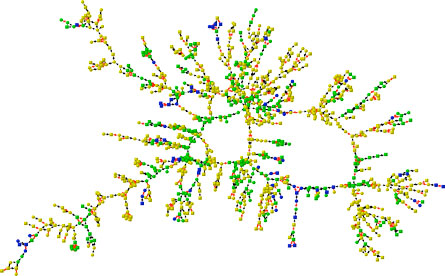 The book Connected was recommended by my colleague, intellectual beacon and friend, Susannah Fox of the Pew Internet & American Life Project. In the midst of late nights analyzing health reform scenarios and medical microeconomics, I’ve made the time to read this book in its entirety. It’s been a worthwhile investment.
The book Connected was recommended by my colleague, intellectual beacon and friend, Susannah Fox of the Pew Internet & American Life Project. In the midst of late nights analyzing health reform scenarios and medical microeconomics, I’ve made the time to read this book in its entirety. It’s been a worthwhile investment.
Previously, the authors of Connected, Nicholas Christakis and James Fowler, found evidence on connectedness in health in the areas of obesity, smoking cessation, binge drinking, and other lifestyle behaviors that directly impact good or bad health.
This week, another team of innovative thinkers led by John Caccioppo from the University of Chicago published their latest findings on the contagiousness of loneliness in the December issue of the Journal of Personality and Social Psychology. The researchers dug deep into the Framingham Heart Study, the rich database of which was also used by Christakis and Fowler.
Christakis says that, “People on the edge of the network spread their loneliness to others and then cut their ties.” Caccioppo’s take on this is that, “an extraordinary pattern of contagion…leads people to be moved to the edge of the social network when they become lonely…on the periphery people have fewer friends, yet their loneliness leads them to losing the few ties they have left.” He compared this process to that of the loose ends of a crocheted sweater that, with the pull of one thread, can unravel the entire garment. That is the metaphor for tightly-woven social fabric.
Loneliness has been found to be a risk factor in heart disease, Alzheimer’s disease, and mental health, among other conditions.
Health Populi’s Hot Points: Here’s further food for thought on the issue of personal/public engagement and their impact on health — from personal health spreading to aggregate public health. Here’s an aspect of health that has little to do with health care, and more to do with, “It takes a village….”
While there are some researchers who aren’t fully convinced, statistically, of the power of connectedness and health, more anecdotal dots are being connected that bolster the theory. For the time being, people operating in public health should leverage the power of connectedness for better individual patient outcomes that will lead to improved community health.




 I am so grateful to Tom Lawry for asking me to pen the foreword for his book, Health Care Nation,
I am so grateful to Tom Lawry for asking me to pen the foreword for his book, Health Care Nation,  I love sharing perspectives on what's shaping the future of health care, and appreciate the opportunity to be collaborating once again with Duke Corporate Education and a global client on 6th May. We'll be addressing some key pillars to consider in scenario planning such as growing consumerism in health care, technology (from AI to telehealth), climate change, and trust -- the key enabler for health engagement or dis-engagement and mis-information. I'm grateful to be affiliated with the corporate education provider
I love sharing perspectives on what's shaping the future of health care, and appreciate the opportunity to be collaborating once again with Duke Corporate Education and a global client on 6th May. We'll be addressing some key pillars to consider in scenario planning such as growing consumerism in health care, technology (from AI to telehealth), climate change, and trust -- the key enabler for health engagement or dis-engagement and mis-information. I'm grateful to be affiliated with the corporate education provider  Thank you FeedSpot for
Thank you FeedSpot for